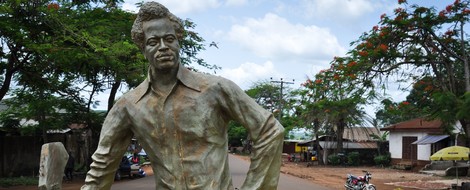Your podcast discovery platform
Curious minds select the most fascinating podcasts from around the world. Discover hand-piqd audio recommendations on your favorite topics.

piqer for: Global finds Globalization and politics
Rosebell is a multimedia communications specialist, journalist and award-winning blogger with experience in gender, peace and conflict. Currently works on public interest litigation for gender justice with focus on Latin America -Africa learning. Rosebell holds a Masters in media, peace and conflict studies from the University for Peace in Costa Rica. She is a World Economic Forum Young Global Leader.
His Biggest Hit Sold More Copies Than Any Of The Beatles’. So Why Haven’t You Heard of Him?
His voice was reverberating on airwaves all over Africa. Prince Nico Mbarga is still high up on our party playlist, and to be specific his song, Sweet Mother.
I have heard this played in different bars and clubs in over a dozen countries on the continent, yet his story has eluded even the biggest lovers of this hit song.
Sweet Mother is a celebration of a mother's love and care for her child, and it makes even our elders jump to the dance floor at a party.
Mbarga died 20 years ago on June 24, 1997, after an accident and two weeks in a hospital bed. The son of a Cameroonian father and a Nigerian mother, Mbarga's Sweet Mother sold at least 13 million copies across the African continent – more than The Beatles’ bestseller, I Want to Hold Your Hand. Yet little is available on the story of the singer of Africa's most famous song.
The writer travels to Mbarga's hometown Esame, speaking to his wife, and Lucy, his first love and a childhood friend. Twenty years after his death, this is an in-depth obituary. It delves into what shaped Prince Nico Mbarga's life, and obviously highlife music, in years shortly before independence from Britain was a big influence. The article is woven around how big historical events impacted on a young Mbarga.
Sweet Mother was "inspired by the loving sacrifices Mbarga saw his own mother, a widowed farmer, make after his father died" and very much still resonates today.
"The Sweet Mother ideal, the all-consuming mother, not eating until her children are fed, not sleeping until they sleep, crying when they are sick, might be a little conservative, but it has deep cultural roots."
Although he sold millions of copies, Mbarga and the group never got much of the money made from Sweet Mother, as royalty payments were limited by the hundreds of pirate recordings of the song.
"No one involved with Sweet Mother is now living a life that would suggest they were behind one of the top 20 bestselling songs in history."
